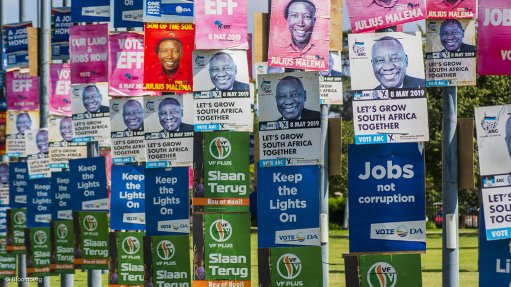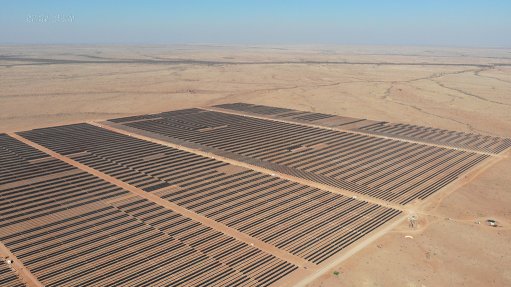BRI a conduit for Chinese engagement, trade, development with Africa and the world
The Belt and Road Initiative (BRI), which is an infrastructure development and integration initiative championed and mainly funded by China, has emerged as a conduit for translating China's growing influence into trade, development and cultural engagements and partnership with the global South.
Dignitaries and academics at the BRI Conference, hosted by the University of the Witwatersrand, on Friday, spoke about the opportunities, risks and impacts of the envisioned development of the BRI trade routes on Africa and its development objectives.
Chinese ambassador to South Africa Lin Songtian emphasised that the BRI was part of China opening itself up to the rest of the world for trade, industrial, cultural and academic relations to achieve its own development agenda. He also spoke of the need to synergise African countries' development plans with the BRI projects.
The BRI has, since 2013, evolved from a regional integration initiative to a broader investment and engagement platform for China, its trade partners and developing countries along the proposed routes and has secured agreements with 113 countries and 29 international organisations. It comprises three overarching collaboration principles and five focus areas that form the basic principles and rules of engagement for BRI projects, explained Lin.
The three principles emphasised cooperative planning, the building and sharing of infrastructure, and funding among participants, and the five focus areas were to develop and expand policy, infrastructure, trade, finance and people links in the partner countries and between the partners and China.
These principles and focus areas were drawn from China's own development experiences, said Lin, and noted that the BRI projects, and the tone of China's engagement with partner countries, was to support a win-win cooperation model for the development of infrastructure.
"The BRI is focused firstly on economic development and open development cooperation without geographic or ideological barriers, as long as the partners agreed to the BRI's principles, and it is not a 'China First' or 'China only' policy, but aims to see common development and aims to secure benefits for participants through the integration of economies and interconnected development that supports partner countries' competitive strengths," said Lin.
He exhorted African countries to develop long-term plans and policies and to eliminate bottlenecks to its industrial and agricultural modernisation. The aim was to secure cooperation to support African countries to develop their railways, highways, power grids, air transport and telecommunications to promote African industrial and agricultural modernisation, harmonisation and digitalisation.
Lin added that these fundamentals were essential for Africa to work with China to meet Fourth Industrial Revolution challenges and changes, which were already taking place, and emphasised that countries had to prepare for these changes.
Parliament national assembly chairperson Cedric Frolick, meanwhile, spoke about the need, as reflected in the Forum on China-Africa Cooperation, which had also catalysed China's engagement with and focus on Africa, to ensure that development was done with cognisance of the environment, noting that the interests of nations' people, as represented and articulated through their Parliaments, could only be ensured if development took place while addressing the environmental and ecological requirements, challenges and concerns expressed by citizens as a key principle of implementation of BRI projects.
Department of International Relations and Cooperation chief director Dr Manelisi Genge said the BRI could encounter the known challenges of a lack of industrial capacity and infrastructure backlogs in Africa, which was hampering economic development.
However, the African Union's Agenda 2063 accelerated development initiative, which recognised the development of infrastructure as a necessary component for industrialisation, was an effective framework for countries to engage in the BRI and projects to drive the reindustrialisation of African economies, improve connectivity and interconnectedness, as well as support technology and skills transfer.
Genge said African countries had to make progress with their major infrastructure projects to help pave the way for engagement on the BRI.
Africa had to balance its interests with that of its partners and ensure that these converged as part of the implementation and development of the projects. This could only be achieved through a coordinated effort and a clear plan to define the objectives of nations.
Professor Garth Shelton, from Wits, reflected on the relevance of the development lessons China brought as part of the BRI and emphasised that Africa should learn from the practices that had helped China lift 780-million people out of poverty and build a middle class of 400-million people.
"BRI is the next phase of globalisation, and is a positive process. It is important to uplift people because as the world becomes more globalised, it becomes more interdependent, which reduces the chances for conflicts and increases the chance for greater prosperity."
Africa was already a key focus of the BRI, as a growth region, but it needs to ensure that it supports engagement and participation through investment and research, he said.
"Participation in the BRI can help Africa to achieve its Agenda 2063. Africa urgently has to strengthen its plans for infrastructure and provide feasible and bankable projects so that the BRI can begin work in Africa. We have to work harder to connect with the BRI. China is ready as soon as we get our plans in order to begin to build prosperity," said Shelton.
Comments
Press Office
Announcements
What's On
Subscribe to improve your user experience...
Option 1 (equivalent of R125 a month):
Receive a weekly copy of Creamer Media's Engineering News & Mining Weekly magazine
(print copy for those in South Africa and e-magazine for those outside of South Africa)
Receive daily email newsletters
Access to full search results
Access archive of magazine back copies
Access to Projects in Progress
Access to ONE Research Report of your choice in PDF format
Option 2 (equivalent of R375 a month):
All benefits from Option 1
PLUS
Access to Creamer Media's Research Channel Africa for ALL Research Reports, in PDF format, on various industrial and mining sectors
including Electricity; Water; Energy Transition; Hydrogen; Roads, Rail and Ports; Coal; Gold; Platinum; Battery Metals; etc.
Already a subscriber?
Forgotten your password?
Receive weekly copy of Creamer Media's Engineering News & Mining Weekly magazine (print copy for those in South Africa and e-magazine for those outside of South Africa)
➕
Recieve daily email newsletters
➕
Access to full search results
➕
Access archive of magazine back copies
➕
Access to Projects in Progress
➕
Access to ONE Research Report of your choice in PDF format
RESEARCH CHANNEL AFRICA
R4500 (equivalent of R375 a month)
SUBSCRIBEAll benefits from Option 1
➕
Access to Creamer Media's Research Channel Africa for ALL Research Reports on various industrial and mining sectors, in PDF format, including on:
Electricity
➕
Water
➕
Energy Transition
➕
Hydrogen
➕
Roads, Rail and Ports
➕
Coal
➕
Gold
➕
Platinum
➕
Battery Metals
➕
etc.
Receive all benefits from Option 1 or Option 2 delivered to numerous people at your company
➕
Multiple User names and Passwords for simultaneous log-ins
➕
Intranet integration access to all in your organisation


















